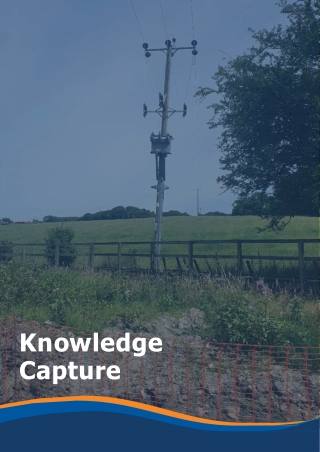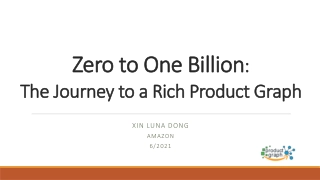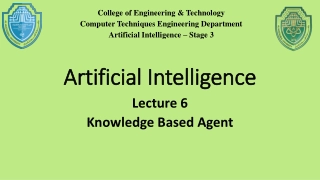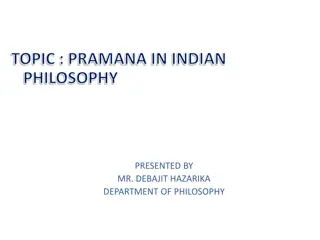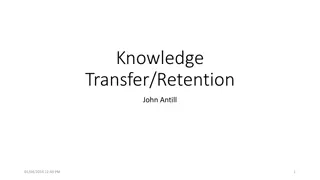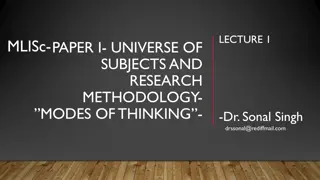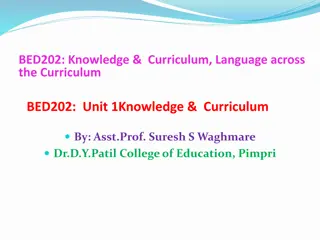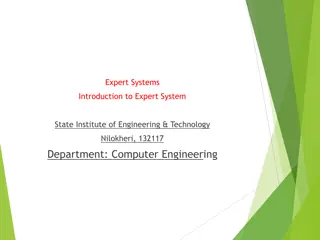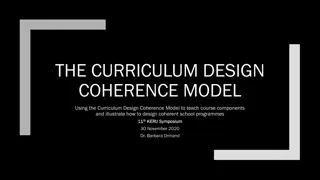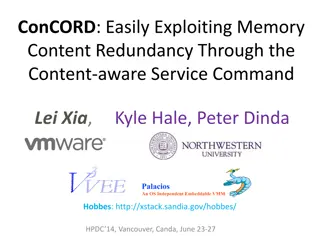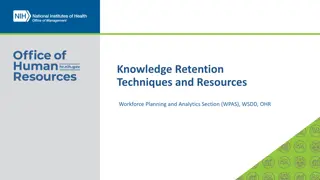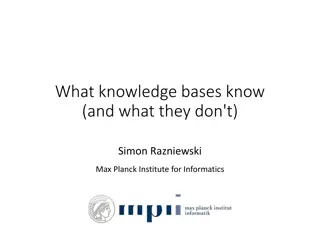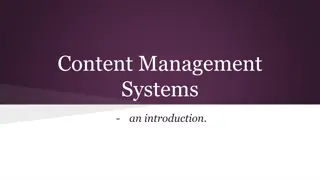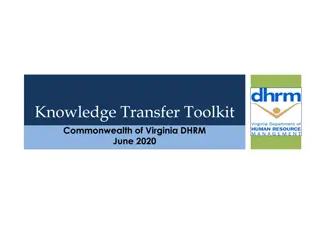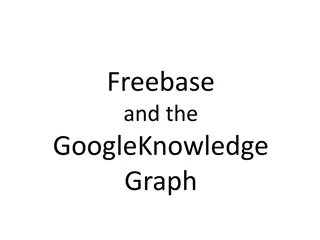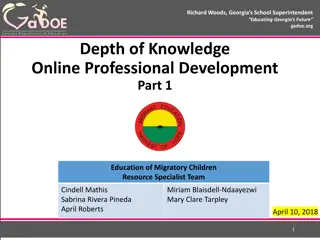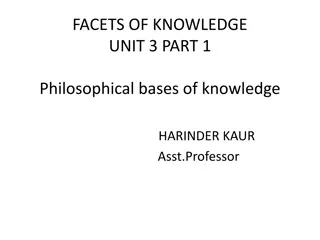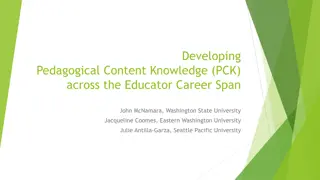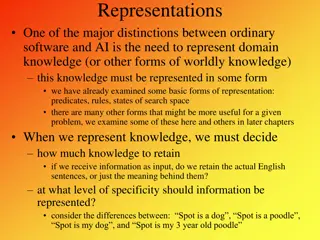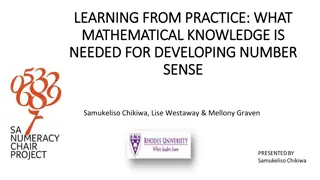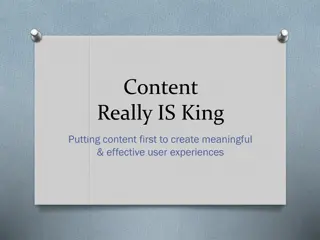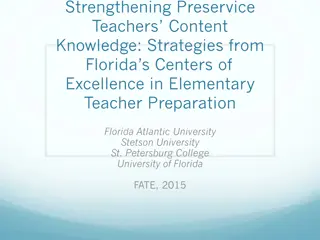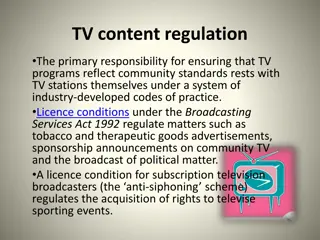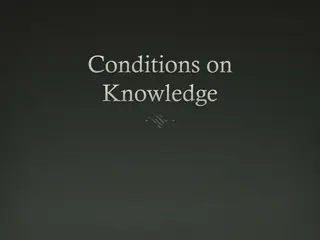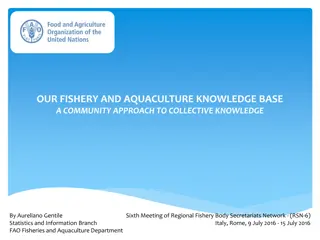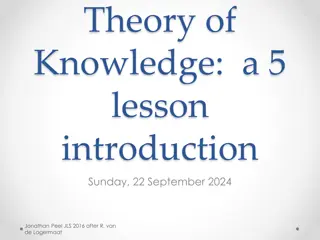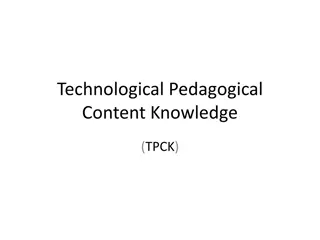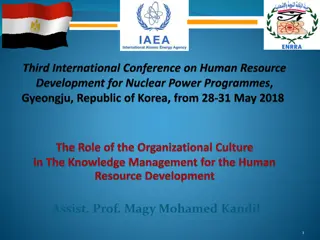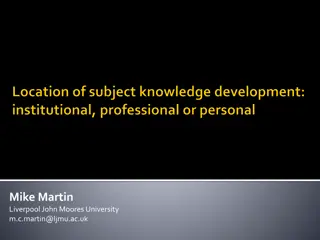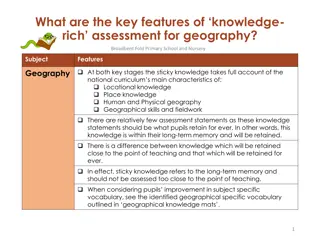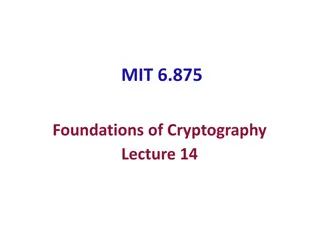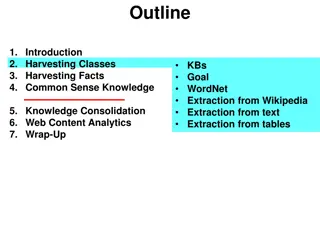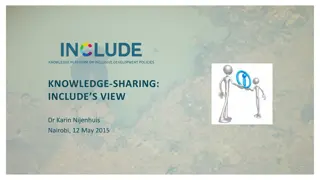Knowledge Capture
Knowledge capture is crucial for organizations to retain valuable expertise and prevent loss of critical knowledge due to employee turnover. Tacit and explicit knowledge play key roles, requiring strategic planning for retention, incentivizing knowledge-sharing culture, and implementing effective st
0 views • 6 slides
Exploring Product and Knowledge Graphs for Enhanced Information Retrieval
Dive into the world of product and knowledge graphs, uncovering the journey to a rich product graph, examples of knowledge graphs for songs, and the mission to provide comprehensive information on products and related knowledge. Discover use cases ranging from information provision to enhancing sear
3 views • 76 slides
Understanding Knowledge-Based Agents in Artificial Intelligence
Knowledge-Based Agents in AI utilize logic and knowledge representation to accept tasks, learn, and adapt to changing environments. Logic plays a crucial role in forming complex world representations and deriving actions based on inference. The central component is the Knowledge Base (KB), represent
4 views • 19 slides
Understanding Knowledge Management: Processes and Frameworks 2. In knowledge management, organizations create, share, and manage knowledge to enhance performance. It involves acquiring different types of knowledge through various means, such as perc
Knowledge Management, Organizational Objectives, Types of Knowledge, Tacit Knowledge, Explicit Knowledge
1 views • 17 slides
Understanding Pramana in Indian Philosophy by Mr. Debajit Hazarika
Philosophy delves into the quest for knowledge, with Epistemology exploring sources and validity. In Indian philosophy, Prama signifies true cognition, attainable through Pramana - the means to achieve valid knowledge. This discussion covers the six pramanas within various philosophical systems and
2 views • 11 slides
Pedagogical Shift in Physical Science: Constructing Knowledge Through Learner-Centered Experiences
There is a significant pedagogical shift in physical science education from viewing science as a fixed body of knowledge to emphasizing the process of constructing knowledge. Learners are now placed at the center stage, engaging in inquiry-based learning, critical thinking, and collaborative interac
3 views • 21 slides
2020 Quiz Rounds - Test Your Knowledge on Events, General Knowledge, Close-up Images, and Food
Test your knowledge with these engaging quiz rounds covering various topics such as events from 2020, general knowledge questions, close-up image rounds, and food-related queries. Challenge yourself and see how well you fare in these diverse categories.
0 views • 13 slides
Importance of Knowledge Retention in Organizations
Organizations face negative impacts on performance due to the loss of knowledge. Strategies such as exit interviews, mentorship, and knowledge sharing tools are vital for effective knowledge retention. Assessing knowledge retention maturity through various techniques is crucial, aligning with ISO st
0 views • 11 slides
Understanding Modes of Thinking and Knowledge Development
Man's acquisition of knowledge is intricately linked to his ability to think, reason, and perceive. Knowledge is a result of experiences gained through perception, intellect, and intuition. The history of humanity is a story of knowledge acquisition and development, with man at the forefront as the
1 views • 18 slides
Understanding Data, Information, Knowledge, and Curriculum in Education
Data is raw facts and figures, information is interpreted data with meaning, and knowledge is the accumulation of facts and information. The nature of knowledge involves acquiring information from real-life experiences and education. This content delves into the distinctions between data, informatio
0 views • 64 slides
Understanding Expert Systems in Computer Engineering
Expert systems are interactive computer-based decision tools that utilize facts and heuristics to solve various problems based on knowledge acquired from experts. This system consists of three main components: User Interface, Inference Engine, and Knowledge Base. The User Interface facilitates commu
4 views • 29 slides
Enhancing Teaching Through Curriculum Design Coherence Model
Explore the use of the Curriculum Design Coherence Model (CDC) for designing effective lectures and guiding pre-service teachers in creating coherent lesson plans. Learn about epistemic progression, systematic ordering of knowledge, types of knowledge, and Bernsteins's knowledge structures to design
0 views • 26 slides
ConCORD: Exploiting Memory Content Redundancy Through Content-aware Services
Memory content-sharing detection and tracking are crucial aspects that should be built as separate services. ConCORD, a distributed system, efficiently tracks memory content across entities like VMs and processes, reducing memory footprint size and enhancing performance. The implementation involves
0 views • 56 slides
Effective Knowledge Retention Strategies in Workforce Planning and Analytics
Retaining knowledge is crucial for organizations to enhance customer service, foster innovation, improve efficiency, and bridge skill gaps. This article explores the significance of knowledge retention, the types of knowledge essential for succession planning, and two effective strategies - the Know
1 views • 10 slides
Exploring Knowledge Base Construction and Commonsense Knowledge in Fiction
Delve into innovative research interests focusing on knowledge base construction using fictional texts as archetypes, taxonomies for constructing knowledge bases, and extraction of commonsense knowledge from diverse sources. Challenges such as sparsity and semantics are addressed through comprehensi
3 views • 48 slides
Understanding Content Management Systems
Content Management Systems (CMS) are computer applications that enable easy publishing, editing, and management of content on websites. They help in organizing, maintaining, and updating content efficiently from a centralized interface. With features like web-based publishing, revision control, and
4 views • 10 slides
Knowledge Transfer Toolkit for Organizational Success
This toolkit, developed by the Commonwealth of Virginia DHRM in June 2020, covers the essentials of knowledge transfer, including its definition, impact, challenges, and management strategies. It emphasizes aligning knowledge transfer with strategic goals, overcoming barriers through leadership supp
2 views • 15 slides
Evolution of Freebase and the Google Knowledge Graph
Freebase was initially created in 2005 as an open shared database of knowledge, later acquired by Google and absorbed into the Google Knowledge Graph. Its approach included crowdsourcing updates and additions, focusing on data rather than text. The schema of Freebase included around 1500 types, 3500
1 views • 12 slides
Understanding Depth of Knowledge in Education
Exploring Depth of Knowledge (DOK) as a key concept in education, this content delves into how DOK can enhance student engagement and critical thinking skills. Richard Woods, Georgia's School Superintendent, provides insights on applying DOK across different grade levels and content areas, emphasizi
0 views • 19 slides
Facets of Knowledge: Exploring Philosophical Bases and Types
Delve into the philosophical foundations and types of knowledge with insights on local and universal knowledge, theoretical and practical aspects, and school versus out-of-school knowledge. Understand how facets contribute to extended knowledge about attributes within different frames.
0 views • 10 slides
Developing Pedagogical Content Knowledge (PCK) for Educator Excellence
Explore how Developing Pedagogical Content Knowledge (PCK) throughout an educator's career enhances student learning and growth. Learn strategies to integrate content knowledge, pedagogy, and socio-emotional learning effectively. Discover the progression of teacher development from recruitment to le
2 views • 29 slides
Understanding Knowledge Representation in Artificial Intelligence
In AI, representing domain knowledge is crucial and comes in various forms like predicates, rules, and search space states. Deciding the level of specificity and form of representation is key. Knowledge can be categorized into procedural, domain, and common sense knowledge, available in forms such a
2 views • 32 slides
Developing Mathematical Knowledge for Teaching in South Africa
Mathematics education in South Africa faces challenges due to insufficient Mathematical Knowledge for Teaching (MKfT) among teachers. Research highlights the need for teachers to possess both subject matter knowledge and pedagogical content knowledge to effectively teach mathematics. Identifying and
0 views • 17 slides
Putting Content First for Effective User Experiences
Content is king in creating meaningful user experiences. Emphasizing content over design and incorporating change management can lead to smoother processes and better user satisfaction. Experts highlight the importance of focusing on content before design, debunking assumptions about content's role,
0 views • 46 slides
Strategies for Strengthening Preservice Teachers' Content Knowledge in Florida
Explore the collaborative efforts of Florida Atlantic University, Stetson University, St. Petersburg College, and the University of Florida to enhance preservice teachers' content knowledge in elementary teacher preparation. Initiatives include developing content coursework, forming collaborative te
0 views • 20 slides
Television Content Regulation in Australia
Television content regulation in Australia is overseen by industry-developed codes of practice and specific licence conditions under the Broadcasting Services Act 1992. TV stations hold the primary responsibility to ensure that programs reflect community standards. Regulations cover areas such as to
0 views • 12 slides
The Significance of B2B Content Marketing Transformation
In the evolving B2B marketing landscape, content has become crucial. By 2020, customers will engage with enterprises largely through digital means. B2B companies must embrace a content-centric approach to keep up with changing buyer behaviors. Utilizing content calendars, managing websites and blogs
0 views • 18 slides
Exploring Epistemology: Understanding Knowledge and Truth
Epistemology delves into the nature of knowledge, understanding, wisdom, and justification, questioning the extent of human knowledge and the different kinds of knowledge. It explores skepticism and conditions on propositional knowledge, discussing whether knowledge implies truth and the debate betw
1 views • 54 slides
Navigating the World of Big Data, Knowledge, and Crowdsourcing
The world has evolved into a data-centric landscape where managing massive amounts of data requires the convergence of big data, big knowledge, and big crowd technologies. This transformation necessitates the utilization of domain knowledge, building knowledge bases, and integrating human input thro
1 views • 5 slides
Enhancing Fisheries and Aquaculture Knowledge for Sustainable Development
The Fishery and Aquaculture Knowledge Base, presented at the Sixth Meeting of Regional Fishery Body Secretariats Network, focuses on collective knowledge exchange in the fisheries and aquaculture sector. This knowledge hub offers a wealth of information on various aspects, supporting Sustainable Dev
0 views • 13 slides
Exploring the Nature of Knowledge in Theory of Knowledge
Delve into the essence of knowledge with Jonathan Peel's introduction to Theory of Knowledge, pondering on how different disciplines perceive knowledge, the impact of empirical questioning, and timeless wisdom on ignorance and progress. Explore the concept of basic knowledge and its implications, in
0 views • 37 slides
Understanding Modelling Knowledge and Knowledge Representation
Explore the significance of modelling knowledge through knowledge representation, making it explicit, independent, and reusable. Learn why knowledge representation is essential and how it facilitates exchange, query, inference, and visualization. Delve into examples of knowledge application in vario
0 views • 30 slides
Pretrial Services Agency Competencies in Treatment: Knowledge and Skills Assessment
This content outlines the competencies required in the area of treatment by pretrial services agencies. It focuses on the knowledge and skills related to substance-related treatment, mental health disorders, supervision procedures, treatment programs, regulatory knowledge, HISP monitoring policies,
0 views • 22 slides
Understanding Technological Pedagogical Content Knowledge (TPCK)
Technological Pedagogical Content Knowledge (TPCK) is a framework developed by Punya Mishra and Matthew J. Koehler that integrates content, pedagogy, and technology for effective teaching. TPCK emphasizes the interaction between these three key components to enhance technology integration in educati
0 views • 55 slides
Enhancing Human Resource Development through Knowledge Management
Monitoring and improving human performance in nuclear facilities is a key challenge, with knowledge management playing a crucial role in increasing staff competence. Organizational culture influences knowledge-sharing success. Explore the components of knowledge management, its importance in nuclear
0 views • 17 slides
Understanding Subject Knowledge Development in Education
Exploring the complexities of subject knowledge development in education, this study delves into areas such as students' existing knowledge, competencies, and the role of institutions in shaping knowledge acquisition. The focus lies on personalizing knowledge to individual needs rather than a fixed
1 views • 22 slides
Key Features of Knowledge-Rich Assessment in Geography at Broadbent Fold Primary School
Broadbent Fold Primary School emphasizes sticky knowledge in geography assessment focusing on locational knowledge, place knowledge, human and physical geography, and geographical skills. Assessment statements aim to facilitate long-term retention of knowledge, vocabulary acquisition, and fieldwork
0 views • 8 slides
Zero-Knowledge Proofs in Cryptography
Exploring zero-knowledge proofs in cryptography, this content delves into interactive protocols, perfect zero-knowledge definitions, and the QR protocol's honest verifier and malicious verifier zero-knowledge theorems. It discusses how simulators work to maintain zero-knowledge properties and the si
0 views • 37 slides
Understanding Knowledge Bases and Harvesting Information
This content delves into the concept of knowledge bases, exploring how information is harvested, consolidated, and analyzed. It covers the extraction of data from various sources like WordNet, Wikipedia, and web content, providing insights into classes, facts, and common sense knowledge. The goal is
0 views • 23 slides
Knowledge Sharing and Inclusive Development Policies
Knowledge Platform on Inclusive Development Policies (INCLUDE) focuses on enhancing research utilization in policy-making to foster more inclusive development. It was established in 2012 with the aim of bridging the gap between research and policy processes in African countries. INCLUDE engages expe
0 views • 8 slides
